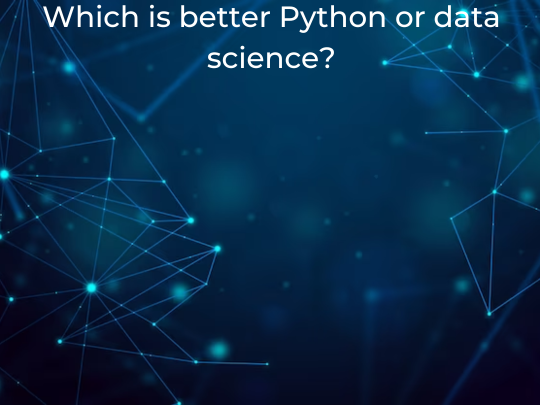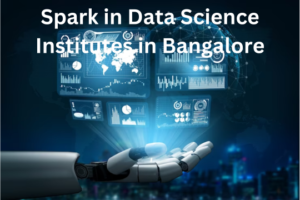Python and data science are often seen as intertwined and complementary aspects of the modern tech landscape. Python, a versatile programming language, has gained significant popularity within the data science community due to its extensive libraries, readability, and ease of use. However, it is essential to understand that comparing Python and data science is like comparing the tools with the field they serve. In this article, we will explore the synergy between Python and data science and shed light on their respective importance in the realm of technology and innovation.
Learn the core concepts of Data Science Course video on Youtube:
Python: A General-Purpose Programming Language:
Python has gained immense popularity as a general-purpose programming language known for its simplicity, readability, and clean syntax. It offers a wide range of libraries, frameworks, and tools that make it suitable for various applications, including web development, automation, scripting, and data analysis. Python’s versatility makes it a popular choice among developers and data scientists alike.
Wish to pursue career in data scientist? Enroll in the Data Science Certification to start your journey.
Data Science: The Intersection of Domain Expertise and Technology:
Data science, on the other hand, is a multidisciplinary field that combines statistical analysis, mathematics, machine learning, and domain expertise to extract insights from data. It involves the collection, preparation, analysis, and interpretation of data to drive informed decision-making and solve complex problems. Data scientists leverage various tools and programming languages, including Python, to perform data analysis and build predictive models.
Looking forward to becoming Data scientist? check out the Data Science Course with Job Guarantee in Bangalore and get certified today.
Python’s Role in Data Science:
Python has emerged as a dominant programming language in the data science community due to its rich ecosystem of libraries and frameworks specifically designed for data analysis and machine learning. Libraries like NumPy, pandas, and scikit-learn provide powerful tools for data manipulation, exploration, and modeling. Python’s simplicity and expressiveness make it accessible to both beginners and experienced data scientists, enabling them to quickly prototype and deploy data-driven solutions.
Kickstart your career by enrolling in this Best Data Science Course in Hyderabad with Placement.
The Advantages of Python for Data Science:
Python offers several advantages that make it an ideal choice for data science applications:
- Extensive Libraries: Python provides an extensive collection of libraries dedicated to data science, including data manipulation, visualization, and machine learning. These libraries significantly reduce the development time and effort required for data analysis tasks.
- Easy Integration: Python seamlessly integrates with other programming languages, tools, and frameworks, making it easier to combine data science workflows with other components of software development or system architecture.
- Large Community and Support: Python has a vast and active community of developers, data scientists, and enthusiasts. This community contributes to the development of new libraries, provides support, and shares knowledge and best practices through forums, online resources, and collaborative platforms.
- Scalability and Performance: While Python is known for its simplicity, it also offers scalability and performance through libraries like Dask and PySpark, which enable distributed computing and parallel processing for handling large datasets.
The Role of Data Science in Driving Innovation:
Data science plays a critical role in driving innovation across industries. By leveraging advanced techniques like machine learning and predictive analytics, data scientists can uncover patterns, make predictions, and derive actionable insights from data. These insights contribute to improved decision-making, process optimization, product development, and customer experience enhancement.
Wish to pursue a career in data scientist? Enroll in this Best Data Science Course with Placement in Pune to start your journey.
The Importance of Domain Expertise in Data Science:
While Python provides the necessary tools for data analysis, it is crucial to recognize that data science extends beyond programming and requires domain expertise. Data scientists need a deep understanding of the problem domain, the underlying business context, and the relevant statistical and mathematical principles to extract meaningful insights from data. Python serves as a vehicle for implementing and executing data science methodologies but is not a substitute for domain expertise.
excellent tool for rapid prototyping and experimentation in data science. Its intuitive syntax and vast library ecosystem allow data scientists to quickly test and iterate on different approaches, algorithms, and models. Python’s interactive development environment facilitates exploratory data analysis and hypothesis testing, enabling data scientists to gain insights and validate their ideas efficiently.
Pursue a career in Data science with the number one training institute 360DigiTMG. Enroll in the Best Data Science Course in Chennai to start your journey.
Python’s Integration with Big Data Technologies:
As the volume and variety of data continue to grow, data scientists must work with big data technologies to handle and process large datasets. Python seamlessly integrates with popular big data frameworks like Apache Hadoop and Apache Spark, allowing data scientists to leverage distributed computing and parallel processing capabilities. This integration enables data scientists to scale their data analysis workflows and perform complex computations on massive datasets.
The Growing Demand for Python and Data Science Skills:
The demand for professionals with Python and data science skills has been consistently increasing in recent years. As organizations recognize the value of data-driven decision-making, they seek data scientists proficient in Python to extract insights and build predictive models. The ability to leverage Python’s data science ecosystem and apply statistical and machine learning techniques is highly valued in today’s job market.
The Synergy Between Python and Data Science:
Python and data science share a symbiotic relationship. Python empowers data scientists by providing a flexible and powerful programming language for data analysis, modeling, and visualization. Data science, in turn, drives the evolution and adoption of Python libraries and frameworks by pushing the boundaries of data analysis and machine learning techniques. The continuous feedback loop between Python and data science fuels innovation and the development of new tools and methodologies.
Other Programming Languages in Data Science:
While Python is a popular choice for data science, it is not the only programming language used in the field. R, another widely used language, particularly in statistical analysis, provides specialized packages and functionalities for data science tasks. Other languages like Julia and Scala also find applications in specific domains of data science. The choice of programming language depends on factors such as the specific requirements of the project, the existing infrastructure, and the preferences and expertise of the data science team.
Data Science Placement Success Story
Conclusion:
In conclusion, Python and data science are interconnected and mutually beneficial. Python’s versatility, simplicity, and extensive library ecosystem make it an excellent tool for data scientists to perform data analysis, build models, and drive innovation. However, it is important to recognize that data science encompasses more than just programming skills. Domain expertise, statistical knowledge, and problem-solving abilities are equally vital for successful data science endeavors. Python serves as a powerful enabler, facilitating rapid prototyping, experimentation, and integration with big data technologies. As the demand for data scientists continues to grow, proficiency in Python and data science will remain highly sought after in the tech industry. Embracing the synergy between Python and data science opens doors to exciting opportunities and empowers organizations to harness the full potential of their data.
Data Science Training Institutes in Other Locations
Tirunelveli, Kothrud, Ahmedabad, Hebbal, Chengalpattu, Borivali, Udaipur, Trichur, Tiruchchirappalli, Srinagar, Ludhiana, Shimoga, Shimla, Siliguri, Rourkela, Roorkee, Pondicherry, Rajkot, Ranchi, Rohtak, Pimpri, Moradabad, Mohali, Meerut, Madurai, Kolhapur, Khammam, Jodhpur, Jamshedpur, Jammu, Jalandhar, Jabalpur, Gandhinagar, Ghaziabad, Gorakhpur, Gwalior, Ernakulam, Erode, Durgapur, Dombivli, Dehradun, Cochin, Bhubaneswar, Bhopal, Anantapur, Anand, Amritsar, Agra , Kharadi, Calicut, Yelahanka, Salem, Thane, Andhra Pradesh, Greater Warangal, Kompally, Mumbai, Anna Nagar, ECIL, Guduvanchery, Kalaburagi, Porur, Chromepet, Kochi, Kolkata, Indore, Navi Mumbai, Raipur, Coimbatore, Bhilai, Dilsukhnagar, Thoraipakkam, Uppal, Vijayawada, Vizag, Gurgaon, Bangalore, Surat, Kanpur, Chennai, Aurangabad, Hoodi,Noida, Trichy, Mangalore, Mysore, Delhi NCR, Chandigarh, Guwahati, Guntur, Varanasi, Faridabad, Thiruvananthapuram, Nashik, Patna, Lucknow, Nagpur, Vadodara, Jaipur, Hyderabad, Pune, Kalyan.
Data Analyst Courses In Other Locations
Tirunelveli, Kothrud, Ahmedabad, Chengalpattu, Borivali, Udaipur, Trichur, Tiruchchirappalli, Srinagar, Ludhiana, Shimoga, Shimla, Siliguri, Rourkela, Roorkee, Pondicherry, Rohtak, Ranchi, Rajkot, Pimpri, Moradabad, Mohali, Meerut, Madurai, Kolhapur, Khammam, Jodhpur, Jamshedpur, Jammu, Jalandhar, Jabalpur, Gwalior, Gorakhpur, Ghaziabad, Gandhinagar, Erode, Ernakulam, Durgapur, Dombivli, Dehradun, Bhubaneswar, Cochin, Bhopal, Anantapur, Anand, Amritsar, Agra, Kharadi, Calicut, Yelahanka, Salem, Thane, Andhra Pradesh, Warangal, Kompally, Mumbai, Anna Nagar, Dilsukhnagar, ECIL, Chromepet, Thoraipakkam, Uppal, Bhilai, Guduvanchery, Indore, Kalaburagi, Kochi, Navi Mumbai, Porur, Raipur, Vijayawada, Vizag, Surat, Kanpur, Aurangabad, Trichy, Mangalore, Mysore, Chandigarh, Guwahati, Guntur, Varanasi, Faridabad, Thiruvananthapuram, Nashik, Patna, Lucknow, Nagpur, Vadodara, Jaipur, Hyderabad, Pune, Kalyan, Delhi, Kolkata, Noida, Chennai, Bangalore, Gurgaon, Coimbatore.
Navigate To:
360DigiTMG – Data Analytics, Data Analyst Course Training in Bangalore
#62/1, Ground Floor, 1st Cross, 2nd Main, Ganganagar 560032, Bangalore, Karnataka
Phone: 1800-212-654321
Email: enquiry@360digitmg.com
Get Direction: data science courses in bangalore




